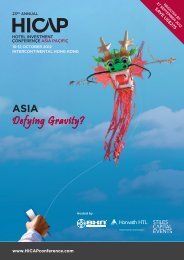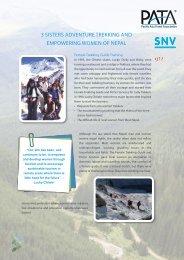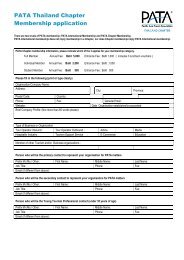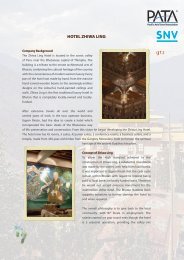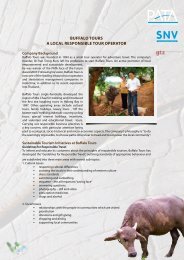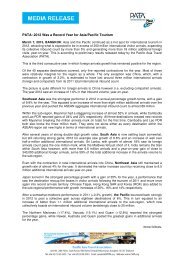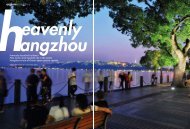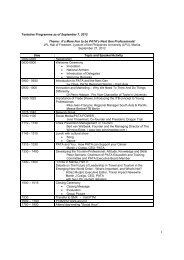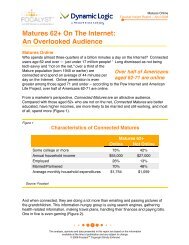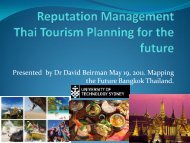luxury eco-resort hotel vil uyana and jetwing development project
luxury eco-resort hotel vil uyana and jetwing development project
luxury eco-resort hotel vil uyana and jetwing development project
You also want an ePaper? Increase the reach of your titles
YUMPU automatically turns print PDFs into web optimized ePapers that Google loves.
LUXURY ECO-RESORT HOTEL VIL UYANA AND<br />
JETWING DEVELOPMENT PROJECT<br />
In 2006, nine months before the launch of the <strong>luxury</strong><br />
<strong>eco</strong>-<strong>resort</strong> Vil Uyana in Sri Lanka, the Jetwing Youth<br />
Development Project (JYDP) was initiated with the<br />
strong support of the local Buddhist temples. As a<br />
result, 40 young <strong>vil</strong>lagers were trained <strong>and</strong> employed<br />
to work in the hospitality sector. Jetwing Hotels, a<br />
local company, owns <strong>hotel</strong>s, Ayurveda <strong>resort</strong>s <strong>and</strong><br />
colonial style <strong>hotel</strong>s at tea plantations in Sri Lanka. Its<br />
management has a broad vision of corporate social<br />
<strong>and</strong> environmental policy, evidenced in their flat<br />
hierarchy <strong>and</strong> innovative approaches to problems.<br />
All of the <strong>hotel</strong>s practice responsible environmental<br />
management keeping with existing laws <strong>and</strong><br />
regulations, sound practices of energy <strong>and</strong> water<br />
conservation, air quality management, pollution<br />
reduction, use of environment-friendly resources,<br />
recycling <strong>and</strong> environmentally friendly purchasing<br />
have been introduced.<br />
‘In our company we<br />
try to allow the ideas<br />
to grow up.’<br />
- Mr Jude Kasturi<br />
Arachchi<br />
(Group Engineer,<br />
Jetwing)<br />
Concept of Hotel Vil Uyana <strong>and</strong> Jetwing Youth Development Project<br />
In October 2006, Jetwing Hotels opened a new <strong>hotel</strong> called Vil Uyana. It is located near Sigiriya Rock<br />
Fortress, a heritage hotspot in the centre of Sri Lanka’s<br />
the so-called Cultural Triangle because of its Buddhist<br />
temples, ancient ruins <strong>and</strong> national parks.<br />
Vil Uyana is the first <strong>hotel</strong> in the world to include a<br />
wetl<strong>and</strong> system. Its lakes <strong>and</strong> reed-beds form a private<br />
nature reserve that provides a haven for wildlife <strong>and</strong> a<br />
setting of peace <strong>and</strong> tranquillity for guests. This manmade<br />
reserve integrates 25 private wooden <strong>luxury</strong><br />
chalets, designed to reflect Sri Lanka’s local <strong>and</strong> rural<br />
traditions.<br />
Because of its high-quality services, complex<br />
environmental management <strong>and</strong> community<br />
participation, the USP for the Hotel Vil Uyana is ‘Extreme Eco <strong>and</strong> Extreme Luxury’<br />
From its very inception, the <strong>hotel</strong> was invited to be a member of Small Luxury Hotels of the World.<br />
Rationale for the Jetwing Youth Development Project (JYDP)<br />
The huge manpower shortage in Sri Lanka has worsened as skilled employees are increasingly<br />
attracted to the Middle East, the Maldives, Europe <strong>and</strong> Canada. Moreover, the country faces the<br />
massive problem of youth unemployment, particularly in rural areas where the schools do not<br />
prepare the students for skilled jobs. Even those in good academic st<strong>and</strong>ing are often not accepted<br />
into universities or within the <strong>eco</strong>nomic mainstream. The wait can be long <strong>and</strong> frustrating <strong>and</strong> these<br />
young people often end up taking whatever jobs are available simply to survive.<br />
1
Jetwing envisions tourism as the ideal vehicle to minimise these problems. To build potential within<br />
the industry, they developed the Jetwing Youth Development Project (JYDP) providing hospitality<br />
training, at no cost, to rural young men <strong>and</strong> women who had completed basic schooling but were<br />
unemployed, as well as to some adult women (ages 40 to 50) who were the sole providers for their<br />
families.<br />
Aims of JYDP<br />
The Jetwing Youth Development Project was designed to improve the Sri Lankan tourism sector in<br />
four ways:<br />
• Addressing <strong>and</strong> offering a solution to the manpower shortage in their own <strong>hotel</strong>s <strong>and</strong><br />
in the Sri Lankan <strong>hotel</strong> industry in general.<br />
• Involving local communities in tourism, sharing its benefits.<br />
• Helping resolve the unemployment problem among Sri Lankan youth.<br />
• Providing the frustrated youth with gainful employment.<br />
‘Being with the community<br />
was our idea. From<br />
the very beginning we felt<br />
very<br />
confident working with<br />
these communities.’<br />
– Mr Kumara Senarathne<br />
(Head of Human Resources,<br />
Jetwing Hotels)<br />
Involvement of Stakeholders<br />
Before starting the <strong>project</strong>, Jetwing informed<br />
important stakeholders about the planned <strong>project</strong>.<br />
Thus, local Buddhist monks, principal teachers,<br />
government authorities <strong>and</strong> interested parents<br />
learned of the company’s intention to offer English<br />
lessons followed by hospitality training at no cost to<br />
unemployed youth in the region.<br />
The idea was especially supported by two chief<br />
Buddhist monks, who distributed the application<br />
forms to potential trainees <strong>and</strong> even offered to<br />
arrange for classes to be held at Buddhist temples<br />
in the neighbouring communities of Kimbissa <strong>and</strong><br />
Rangirigama.<br />
English Language Lessons<br />
In January 2006, the <strong>project</strong> began by offering lessons in the English language to 120 unemployed<br />
youths in the area (86 boys <strong>and</strong> 34 girls). After 2 weeks, those young people who had attended<br />
initially out of curiosity did not return. No allowance was paid to the trainees during that initial period<br />
because Jetwing wanted be sure that only those truly interested in such work would participate in<br />
the programme.<br />
Jetwing believes that learning English is a vital step toward a fulfilling career. The programme is<br />
therefore intended to provide youth from the rural school system with a working knowledge of the<br />
English language, enabling them to express themselves as well as underst<strong>and</strong> others. The company<br />
was extremely fortunate in enlisting a local, highly experienced teacher for the JYDP who could train<br />
the students in practical English, using role-play in a series of real-life situations, as well as exercises in<br />
grammar, general knowledge <strong>and</strong> Western customs.<br />
The Jetwing English course was divided into two classes per week, with a total of 96 hours of instruction<br />
per class. The English training continued once a week during the first year after the opening of Vil<br />
Uyana. Now, 2 years later, the majority of the participants speak moderate to good English, <strong>and</strong> some<br />
have even reached a level of excellence.<br />
Training in Life Skills <strong>and</strong> Hotel Operations<br />
2
After a 4-week period of English instruction,<br />
Jetwing began adding entry-level industry training.<br />
They started with a general introduction to life<br />
skills, including self-<strong>development</strong> through personal<br />
hygiene, good grooming <strong>and</strong> a positive attitude.<br />
After 4 weeks, trainees were assigned to various<br />
areas of <strong>hotel</strong> operation. This was followed by entrylevel<br />
training in the <strong>hotel</strong> staff <strong>vil</strong>lage in the areas of<br />
front office, housekeeping, food <strong>and</strong> beverage <strong>and</strong><br />
kitchen operations. One-day excursions to other<br />
Jetwing Hotels were organised to offer the trainees<br />
further insight into the daily routine of <strong>hotel</strong><br />
operations. Instructions were given in both Sinhala,<br />
the trainees’ mother-tongue, <strong>and</strong> English.<br />
‘I expected that Jetwing<br />
would ask me to teach the<br />
staff – but not the <strong>vil</strong>lagers.<br />
The Jetwing people are not<br />
conventional people, they<br />
have very practical approaches<br />
to problems.’<br />
– Mr Bernard Kasthuri Kumara<br />
(English Teacher)<br />
Since the trainees had very little knowledge about the area, Jetwing also introduced them to the<br />
cultural history of the Sigiriya area, including classes on the country’s diverse flora <strong>and</strong> fauna as part<br />
of a larger lesson about environmentally-friendly <strong>hotel</strong> management.<br />
The training was based on Jetwing’s clearly defined corporate ethos; its vision, mission, core values<br />
<strong>and</strong> corporate stance on customer care <strong>and</strong> etiquette:<br />
• Life skills – the importance <strong>and</strong> benefits of employment<br />
• Teamwork<br />
• Meditation<br />
• Mind enrichment – appreciating the meaning of life; finding your own identity; meditating,<br />
contemplating <strong>and</strong> thinking positively; showing humility, kindness <strong>and</strong> love<br />
• Mind cleansing – avoiding jealousy, anger, hatred, snobbishness, uncooperativeness<br />
<strong>and</strong> other behaviours that hamper an individual’s performance<br />
• Appreciation, respect for others, willingness to admit mistakes<br />
Many of the trainees felt that this curriculum helped both personally <strong>and</strong> professionally, building<br />
their team-work skills <strong>and</strong> discipline.<br />
‘I learned a lot of things, not<br />
only tourism – especially<br />
what is important about<br />
work – how to work with my<br />
colleagues without having<br />
any arguments.’<br />
– Ms Amali Liyanage, age<br />
22 (Assistant Receptionist,<br />
Front Office)<br />
Ceremony<br />
After 5 months, 50% of the students graduated,<br />
60 in total, <strong>and</strong> organised their own graduation<br />
ceremony, which was held in June 2006 under<br />
the distinguished patronage of the Secretary to<br />
the Ministry of Tourism, representatives of the<br />
media <strong>and</strong> other dignitaries. This ceremony was<br />
an extremely important event for the trainees; a<br />
chance to demonstrate what they had achieved in<br />
the past months. Afterwards, they moved into the<br />
<strong>hotel</strong> for the final 4 months of preparation before<br />
the <strong>hotel</strong> was opened. About 40 graduates were<br />
employed by Jetwing. The English <strong>and</strong> hospitality<br />
training continued for one more year on a regular<br />
basis.<br />
3
‘This <strong>project</strong> has been a tremendous success.<br />
Most of these children, not knowing how<br />
to write even their name when they joined,<br />
are now able to carry on a simple, decent<br />
conversation with the discerning clientele.’ – Mr<br />
Kumar Senaratne (Head of Human Resources,<br />
Jetwing)<br />
Gender Considerations<br />
Especially among rural people in Sri Lanka,<br />
tourism does not have a good reputation, as it is<br />
commonly associated with ‘sun, s<strong>and</strong> <strong>and</strong> sex’.<br />
At first, some parents were wary about sending<br />
their young daughters to the training classes.<br />
But when it was made clear that Jetwing has<br />
a strict policy against sexual harassment in<br />
the workplace, the young women <strong>and</strong> their<br />
parents felt that they would be safe <strong>and</strong> secure<br />
at Vil Uyana.<br />
Investment<br />
Jetwing itself invested a total of US$7,500 in<br />
these training activities, including the English<br />
classes.<br />
Benefits for All Stakeholders<br />
The benefits achieved so far are diverse, as<br />
reflected in the stakeholders’ responses to indepth<br />
interviews conducted in September<br />
2008 by a consultant of German Technical<br />
Cooperation (GTZ). Below is a summary of<br />
selected comments <strong>and</strong> feedback from the 29<br />
interview partners.<br />
From participants of JYDP <strong>and</strong> staff of Vil<br />
Uyana:<br />
• Stable <strong>eco</strong>nomic situation (fixed income);<br />
the income is between 8,000 <strong>and</strong> 15,000<br />
rupees (US$80-150), including service charges.<br />
Most of the young staff deposit 10-20% or even<br />
more of their salary into a bank account <strong>and</strong><br />
spend the rest on daily living expenses or to support to their parents.<br />
• The salary is comparable to other jobs in this area, such as working as a bus driver<br />
(15,000 rupees) or as a soldier (25,000 rupees). Due to the ci<strong>vil</strong> war in Sri Lanka, all<br />
<strong>hotel</strong>s in the country face a critical situation regarding their low occupancy rate.<br />
The same applies to Vil Uyana, with an average occupancy rate of 20-30% in 2007<br />
<strong>and</strong> 2008. For that reason, the service charge <strong>and</strong> tips are not as high as expected.<br />
Nevertheless, no complaints have been made about this situation, since these<br />
young people are all aware that with one or two more years of experience in this<br />
upper-market <strong>hotel</strong> they can easily find a good-paying <strong>and</strong> skilled job in the tourism<br />
industry in the Maldives or the Middle East for a planned time frame of 2 to 4<br />
4
years.<br />
• Official certificates are presented to those participants who pass their examinations,<br />
giving them good st<strong>and</strong>ing for interviews at other <strong>hotel</strong>s in Sri Lanka or<br />
abroad.<br />
• Annual challenges/contests among Jetwing <strong>hotel</strong>s generate pride <strong>and</strong> confidence<br />
among Vil Uyana staff, since they are often among the winners in each category<br />
(barmen, cooking, reception, housekeeping, etc.).<br />
• Lectures about environmentally-friendly <strong>hotel</strong> management.<br />
• Improved image within the community.<br />
From communities near Vil Uyana:<br />
• Support for three Buddhist temples (water tanks, meditation chambers, meeting<br />
hall, monthly aliments).<br />
• Infrastructure in neighbouring <strong>vil</strong>lages (paved road, electricity, supported excavation<br />
for water pipelines, a laboratory for the <strong>vil</strong>lage school, painting <strong>and</strong> cleaning<br />
of the local hospital.<br />
• Support of the New Year Festival <strong>and</strong> other events<br />
Small food supply (staff sells herbal products <strong>and</strong> fruit to Vil Uyana).<br />
From Jetwing Hotels – Vil Uyana:<br />
• Good relationship with communities <strong>and</strong> authorities in the region, eliminating local<br />
resistance to the construction of the <strong>hotel</strong>.<br />
• Trained staff who underst<strong>and</strong> the vision, mission <strong>and</strong> core values of the Jetwing<br />
Family.<br />
• Staff are local residents, which means that they can go home after their shifts <strong>and</strong><br />
enjoy time with their family instead of spending only 3 or 4 days a month with<br />
them after exhausting, time-consuming travel.<br />
• Very few thefts have been reported at the <strong>hotel</strong> site, even during construction.<br />
Outlook<br />
In April 2007, Vil Uyana was awarded a Pacific Asia Travel Association (PATA) Gr<strong>and</strong> Award in the<br />
Education <strong>and</strong> Training category for its Youth Development Project. Jetwing plans to use this <strong>project</strong><br />
as a model for all their <strong>hotel</strong>s <strong>and</strong> for new investments by adapting the principles to the local<br />
circumstances.<br />
‘Our pilot <strong>project</strong> has proved that rural youth are highly service-orientated, very focused on customercare,<br />
<strong>and</strong> demonstrated their unique suitability for the tourism industry. We will be applying the<br />
lessons learned from our Sigiriya <strong>development</strong> <strong>project</strong> at our other <strong>hotel</strong>s elsewhere in Sri Lanka.’<br />
– Mr Kumara Senaratne (Head of Human Resources, Jetwing)<br />
The participants of the Jetwing Youth Development Project themselves have different perspectives<br />
regarding their future. Nearly all hope to improve their English skills <strong>and</strong> computer knowledge. Most of<br />
them also want to climb the career ladder by b<strong>eco</strong>ming executive chefs or guides or even by working<br />
abroad in the Maldives or the Middle East. Jetwing whole-heartedly approves of these aspirations,<br />
since the JYDP initiative was designed not only to develop rural youth for suitable employment<br />
within Jetwing Hotels but also to create opportunities for them to find employment with other <strong>hotel</strong>s<br />
in the country or overseas. The company believes that most of them will return to a Jetwing Hotel<br />
after a few years, having been inspired by their new experiences <strong>and</strong> skills, but also dedicated to the<br />
core values they learned from the Jetwing Family.<br />
As a result of their experiences <strong>and</strong> training at Vil Uyana, <strong>and</strong> with the certificates they hold in their<br />
5
h<strong>and</strong>s, these young professionals from rural Sri Lanka will undoubtedly have the chance to achieve<br />
their professional dreams. ‘We dreamed a dream’ has b<strong>eco</strong>me a reality.<br />
Fur further information, please contact:<br />
Trevor Reckerman Head Of Marketing<br />
Company:<br />
Jetwing Hotels Ltd.<br />
Tel: 94 11 2345700 Ext – 302<br />
Tel.:<br />
+94 77 2772001 (Mobile)<br />
Fax: +94 11 2345729<br />
E-mail:<br />
trevor@<strong>jetwing</strong>.lk<br />
6




